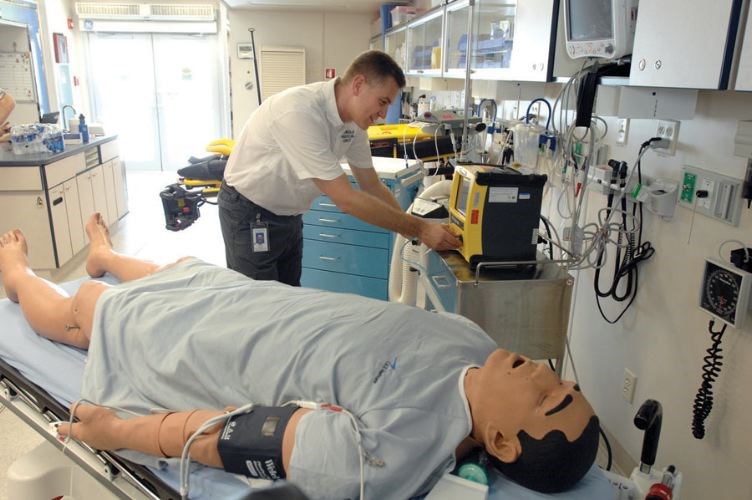If a hospital department in B.C. becomes incapacitated either due to a planned renovation or an unforeseen event, the province's mobile medical unit can come on scene to help out.
The 1,100 square foot unit can morph into anything from a four-bed intensive care unit to an eight- to ten-bed emergency room - it was even designed with a single-bed operating room capacity.
"We can do pretty much anything you can do in an emergency department anywhere in B.C.," mobile medical unit clinical operations director Peter Hennecke said Tuesday as he gave local media a tour of the facility currently parked on the grounds of CNC.
The $6-million unit is composed of two tractor trailers: one houses the mini-hospital and is equipped with state-of-the-art equipment; the other is used for equipment storage and staff quarters.
Once called into service, it takes about eight hours for the unit get ready to deploy from its base in Delta and another four hours to get set up when it arrives on site. Additional time is needed to train local clinical staff on the specifics of the medical equipment so they can handle the day-to-day patient care.
The mobile care centre has been sent all across B.C. since the provincial government purchased it in 2011, although this is its first trip to the north. This spring it was in Pemberton for two months to treat patients displaced by a hospital renovation. It has also been deployed in Surrey when a flood damaged an emergency room and in Cranbrook when it was transformed into an intensive care unit due to renovations.
"The idea is you go to an area and you may not have the infrastructure, but you still have the people," he said. "[Local staff] would come out here and we would just show them how to use the equipment."
Hennecke said the mandate of the unit is to replace services lost due to planned or unforeseen events but it's not meant to be sent to a community dealing with a chronic bed shortage or to provide services not otherwise available at a site.
The unit is capable of responding to disaster situations and has a triage tent that can house even more patients awaiting care. Due the vast distances in the province, however, it may not always be practical to send the mobile unit because of the travel time needed to get to northern or remote locales.
For instance in the event of a mill explosion in northern B.C., the emergency medical crisis would be over before the mobile unit made its way here from its home in Delta.
"Right now there's only one in the province, but it would be ideal if we had one in every health region," Hennecke said. "But it's capital intensive and it takes a lot to maintain these units."
Originally designed and built for the 2010 Winter Olympics, the unit has been sent to major sporting events to provide extra medical support and could find its way back to Prince George for the 2015 Canada Winter Games.
General Electric originally purchased the equipment as part of its Olympic sponsorship, where it was used in Whistler. The province then bought the unit after the Games and put it into service in 2011. Its operations fall under the Provincial Health Service Authority banner, although the $900,000 it costs to run the unit is divided up among all the regional health authorities.
After the province bought it, the surgical facilities were changed to a multipurpose room used for extra patient capacity, minor procedures or counseling.
One of the focuses of this week's trip to Prince George is education. On Thursday, paramedic students from the Justice Institute of British Columbia will team up with nursing students from UNBC for training exercises.
As a training tool, Hennecke said the mobile unit is able to provide students and staff with a realistic setting to do their work.
"It really simulates some of the austere conditions you might have somewhere and we ask people to react," he said. "I find sometimes classrooms can be a bit artificial because they're not set up like the real environment."
Members of the public who want to tour the unit can stop by CNC on Wednesday from 9 a.m. to 7 p.m. After it wraps up its stay in Prince George, it will head to Terrace for more training events with Northern Health staff.



